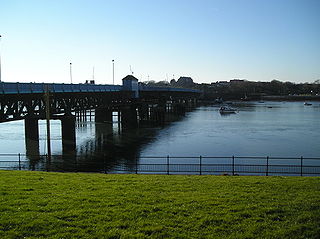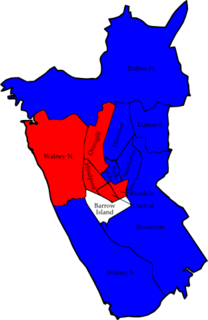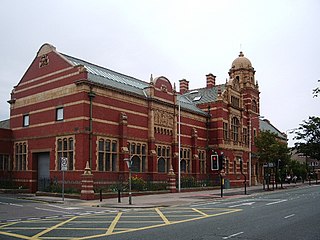Related Research Articles

Barrow-in-Furness, commonly known as Barrow, is a town and borough in Cumbria, England. Historically part of Lancashire, it was incorporated as a municipal borough in 1867 and merged with Dalton-in-Furness Urban District in 1974 to form the Borough of Barrow-in-Furness. At the tip of the Furness peninsula, close to the Lake District, it is bordered by Morecambe Bay, the Duddon Estuary and the Irish Sea. In 2011, Barrow's population was 57,000, making it the second largest urban area in Cumbria after Carlisle, although it is geographically closer to the whole of Lancashire and most of Merseyside. Natives of Barrow, as well as the local dialect, are known as Barrovian.

Barrow-in-Furness is a local government district with borough status in Cumbria, England. It is named after its main town, Barrow-in-Furness. Other settlements include Dalton-in-Furness and Askam-in-Furness. It is the smallest district in the county, but is the most densely populated, with 924 people per square kilometre. The population was 71,980 in 2001, reducing to 69,087 at the 2011 Census.

Walney Island, also known as the Isle of Walney, is an island off the west coast of England, at the western end of Morecambe Bay in the Irish Sea. It is part of Barrow-in-Furness, separated from the mainland by Walney Channel, which is spanned by the Jubilee Bridge. Walney is the largest island of the Furness Islands group, both in population and size, as well as the largest English island in the Irish Sea. Its population at the 2011 UK Census was 10,651, distributed evenly across the island's two Wards of Walney North and Walney South.

Barrow and Furness is a constituency in Cumbria represented in the House of Commons of the UK Parliament since 2010 by John Woodcock. On 30 April 2018, he was suspended from the Labour Party following a sexual harassment allegation made against him. On 18 July 2018, Woodcock resigned from Labour and now sits as an Independent MP.
Barrow-in-Furness Borough Council in Cumbria, England is elected every 4 years. This was changed in 2011 from the previous situation where one third of the council was elected each year, followed by one year where there was an election to Cumbria County Council instead.
The People's Party or Socialist People's Party was a minor political party in the Furness region of England.
Albert Edward Booth was a British left-wing Labour Party politician.
Elections to Barrow-in-Furness Borough Council were held on 7 May 1998. One third of the council was up for election and the Labour party stayed in overall control of the council.
Elections to Barrow-in-Furness Borough Council were held on 6 May 1999. The whole council was up for election with boundary changes since the last election in 1998. The Labour party lost overall control of the council to no overall control.
The 2000 Barrow-in-Furness Borough Council election took place on 4 May 2000 to elect members of Barrow-in-Furness Borough Council in Cumbria, England. One third of the council was up for election and the council stayed under no overall control.
Elections to Barrow-in-Furness Borough Council were held on 1 May 2003. One third of the council was up for election and the Labour party gained control of the council from no overall control.
Elections to Barrow-in-Furness Borough Council were held on 10 June 2004. One third of the council was up for election and the Labour party kept overall control of the council.

Elections to Barrow-in-Furness Borough Council were held on 4 May 2006. One third of the council was up for election and the Labour party lost overall control of the council to no overall control.

Elections to Barrow-in-Furness Borough Council were held on 3 May 2007. One third of the council was up for election and the council stayed under no overall control.

Elections to Barrow-in-Furness Borough Council was held on 1 May 2008. The whole of the council was up for election, with the number of councillors falling from 38 to 36, as a result of ward boundary changes enacted in February 2008. Councillors were elected for terms ranging between two and four years; where more than one councillor was elected in a ward, the councillor with the highest number of votes was granted the longer term.

Local elections were held in the United Kingdom on 3 May 1979. The results provided some source of comfort to the Labour Party (UK), who recovered some lost ground from local election reversals in previous years, despite losing the general election to the Conservative Party on the same day.

The Nan Tait Centre is a Grade II listed building located at Abbey Road in the Hindpool area of Barrow-in-Furness, Cumbria, England. Designed by architects Woodhouse and Willoughby it was built for the Barrow Corporation as the town's new Technical School. The foundation stone was laid on 26 May 1900 and the school was officially opened three years later on 25 August 1903. The Technical School narrowly escaped Luftwaffe bombing during World War II, although its close neighbour Christ Church was almost completely destroyed in April 1941. In 1970 the technical school was replaced by Thorncliffe School in Hawcoat and as a result was neglected falling into a near dilapidated state, despite this the building was ultimately redeveloped in the early 2000s at a cost of £4 million and was named in honour of Agnes "Nan" Tait. The Nan Tait centre is now multifunctional serving as a cultural, exhibition and arts centre as well as a general office building. The Barracudas carnival band, Dare Dance, Capita Symonds, Barrow Borough Sports Council and Barrow Register Office are all tenants of the centre.

The 2010 Barrow-in-Furness Borough Council election took place on 6 May 2010 to elect members of Barrow-in-Furness Borough Council in Cumbria, England. One third of the council was up for election and the council stayed under no overall control.

The 2011 Barrow-in-Furness Borough Council election took place on 5 May 2011 to elect members of Barrow-in-Furness Borough Council in Cumbria, England. The whole council was up for election and the Labour party gained overall control of the council from no overall control.
The 2015 Barrow-in-Furness Borough Council election took place on 7 May 2015 to elect members of Barrow-in-Furness Borough Council in England. This was on the same day as other local elections.